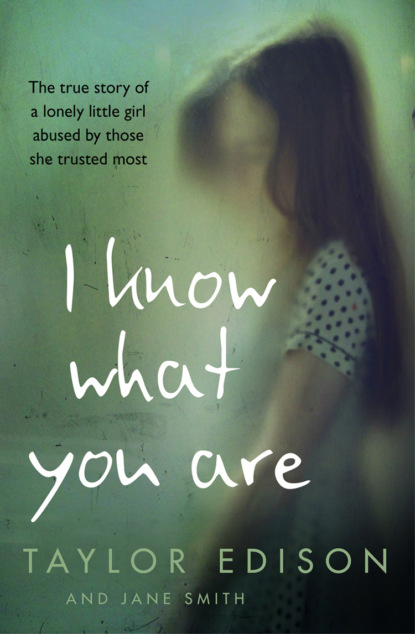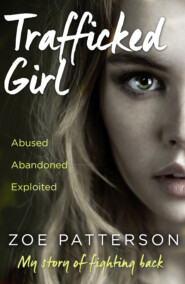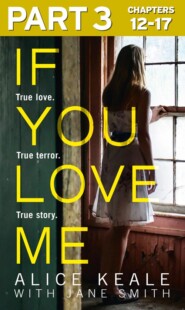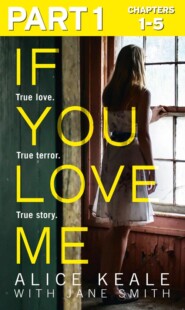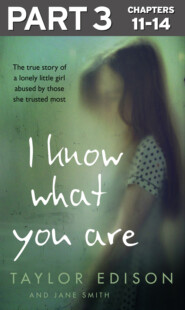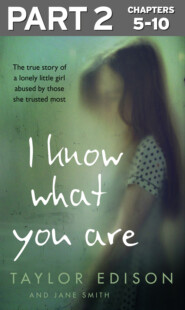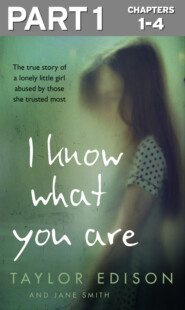По всем вопросам обращайтесь на: info@litportal.ru
(©) 2003-2024.
✖
I Know What You Are: The true story of a lonely little girl abused by those she trusted most
Настройки чтения
Размер шрифта
Высота строк
Поля
One of the things I found most difficult about any kind of interaction with other people was the fact that what they said often seemed to be completely contradicted by what they did. Because I couldn’t interpret people’s body language and took everything at face value, sarcasm was entirely lost on me. And because I didn’t understand people’s reactions, I didn’t ever learn from them. So if kids were mean to me, I would be puzzled and hurt and then go back the next day and make the same mistakes all over again.
I did make one friend, after a few false starts. He was a boy who lived down the road from us, and although he teased and bullied me whenever he saw me, I kept going back and just following him around. Then, one day, he pushed me into some stinging nettles and I ran home, sobbing, with every exposed inch of my body covered in painful red rashes. I went back the next day though, and this time he let me tag along. Maybe he thought I had guts and he decided to give me a chance. But it wasn’t courage that sent me back there. The way he treated me was the way I had been treated by my stepbrothers, and therefore I didn’t expect anything different. And for someone as desperate as I was to have a friend, someone who ignored me was better than no one at all. So being allowed to tag along was more than I could possibly have hoped for.
For a while, I was more than happy to be someone’s tag-along. It was certainly preferable to what was happening at school.
Chapter 2 (#u8e3adb8e-bdb6-524d-bda5-7127df3c8be2)
On one day that I still remember quite clearly, Mum came into the school to complain because I had been physically restrained and had gone home with my arms covered in bruises. When I got really upset about something and the teachers tried to control me using physical force, I would fight back and sometimes even scratch them. I wasn’t being intentionally ‘bad’. Refusing to sit down or walking out of the classroom was an instinctive reaction to the sense of confusion I quickly learned would lead to a really frightening, overwhelming feeling of panic. I couldn’t have described it like that at the time. All I knew was that if someone tried to force me to do something they had explained to me but that I hadn’t understood, it would feel as though there was a ball of tangled, knotted wires moving around inside my head.
I thought I was just ‘difficult’, as Mum always said I was. And I continued to believe that, even after I was diagnosed with autism during my first year at primary school. I actually have something called Asperger syndrome, which explains why I struggled to interact and communicate with other people, and why I was unable to crack the code that would have allowed me to socialise.
People with Asperger syndrome find it difficult – or impossible – to tell other people how they feel and to interpret signs and signals like facial expressions, body language and tone of voice, which reflect someone else’s mood and indicate whether they are happy, sad or angry. As a result, we don’t respond appropriately and, for me, realising I’ve got things wrong or that I can’t make sense of them at all makes me confused and hyper-anxious. So while the other kids were listening to the teachers and learning to do as they were told, I felt as though I was surrounded by people speaking a foreign language and doing random, inexplicable things.
It was a shame no one took the time to explain at least some of that to me when I was six. Maybe they did and I’ve just forgotten, although, even at that young age, I tended not to forget important things if they were explained to me in clear, unidiomatic terms I could understand. Especially things that would have made me feel less guilty about all the trouble I was causing.
Going to school turned out to be the first really distressing experience of my life. To make matters worse, Mum used to threaten me with tales of a place with bars on the doors and windows where children were sent if they were taken away from their parents. ‘Only good children are allowed to stay with their mums,’ she used to tell me. ‘Bad children have to go to the care home.’
It wasn’t until quite recently that I realised what she was describing might have been a borstal, and maybe that’s where she actually spent time as a young teenager, after she was kicked out by my grandma. What Mum probably didn’t realise when I was six was that although I was afraid for my own sake of being sent to ‘the care home’, I was even more afraid for her, because I didn’t know how she would cope if I wasn’t there.
During my first couple of years at school, Mum was often called into meetings to discuss my behaviour. We always had terrible fights before those meetings. But as soon as we were in the presence of teachers or social workers, we would sit very close together and Mum would do all the talking, including answering most of the questions that were addressed specifically to me. In some ways, it might have been better if she had primed me beforehand by telling me exactly what to say and then letting me say it, because whenever I was forced to answer a question myself, I was terrified of saying the wrong thing. But although I have got Asperger syndrome and therefore find many aspects of social interaction very difficult to deal with, I am quite quick in other ways. So I soon learned to smile and babble away about the sort of things that might be of interest to an almost normal, reasonably happy, slightly nerdy child with an autism spectrum disorder.
Mum never actually told them about the fights that preceded those meetings. I think she preferred to communicate the information passively, by not attempting to hide the fresh scratch marks on her arms. I expect they admired her for standing by me and sympathised with her for having to try to cope with my wild behaviour. What they must have seen was a woman on her own struggling to control a physically violent six-year-old. What they didn’t see were the painful red patches on my scalp or the clumps of my hair that had come away in Mum’s hands when she pulled it so hard it brought tears to my eyes.
It seems that Mum was right about social workers though: as long as I was clean, fed and apparently not afraid to sit close to my mother during those meetings, they believed that everything must be all right. Which must have been a relief for them, because no one seemed to know what to do with us. I don’t think they were used to having to deal with kids like me, although Asperger’s tends to be at the less severe end of the autism spectrum, and I can’t have been the only autistic child in the entire county.
The main problem I had was that, because I couldn’t tell anyone what I felt or needed, I would fly off the handle whenever I was confused and frightened, which was quite a lot of the time when I was at school. Every time it happened, someone would phone Mum and ask her to come and pick me up, and I would be suspended for a couple of days.
Paradoxically, in view of the fact that the reason I was in trouble at school was always for displaying the kind of ‘difficult’ behaviour Mum often told me was ruining her life, she always took my side against the teachers. Instead of being angry with me on those occasions, she would smile at me as we walked out of the school, as though we were co-conspirators in some mischievous plot. Then we would run across the road to the park, where she would buy me an ice cream.
What probably made my continued ‘bad’ behaviour even more perplexing and frustrating for my teachers was the fact that the tablets that had been prescribed for me by the doctor when I was first diagnosed with Asperger’s didn’t seem to be doing any good. Maybe they would have helped calm me down a bit and made it all more manageable – for my teachers and for me – if I had been allowed to take them. But although Mum smoked weed, she didn’t believe in tablets, and as soon as we got home from the doctor’s surgery, she threw them all away. So I didn’t ever get the chance to find out what effect they might have had.
One of my greatest fears at that time was that if I didn’t learn to cope, I might actually be sent to a special school or, even worse, to one of the care homes Mum used to tell me about. And if that happened, I would be somewhere that sounded worse than school and Mum would be on her own. That was another reason for wanting to show my teachers I was clever, because then they might believe that everything was all right at home. The problem was I couldn’t read. While I was struggling to try to grasp even the basic concept of reading, some of the other kids in my class were moving on from the few words they had already learned at nursery school. In the end, I was so frustrated by not being able to understand the method the teachers used and so determined to catch up with the others that I taught myself.
I accepted Mum’s insistence that I was perfectly capable of being ‘normal’ if I just tried harder, as any six-year-old would do. But I hated it when she called me ‘a retard’, in a nasty, mocking voice, and when she found ways to make it clear to me that needing extra help at school was something to be ashamed of. Again, I think she hoped that if I was ashamed of my disabilities, I would at least learn to hide them and to present a ‘normal’ front to the world. So she tried – with some success – to make me afraid to be different and to learn to recognise what was ‘normal behaviour’, so that I could copy it.
What she didn’t realise was that I did know, from an early age, that I wasn’t the same as everyone else. I might not have been able to work out for myself what people meant by the things they said and did, but I knew, very often, that what I said and did wasn’t right. The trouble was, the more I tried to be normal, the more stressed I became; and the more stressed I became, the more difficult it was for me to act normally.
Sometimes, when Mum and I were having an argument and I lost my temper, she would smirk, as though she had won, and then walk away. When I was older, I learned to dig my nails into the back of my hand and repeat silently in my head, ‘I have got to keep control of this’. But for me it wasn’t winning or losing a fight that really mattered; what I needed was to be able to talk about whatever had happened. Instead, I bottled everything up inside me until all the suppressed frustrations and anger reached a critical point and exploded again. It was how I felt at school too.
My constant struggle to be normal wasn’t helped by the fact that, for some of the most impressionable early years of my life, I had lived with adults who treated me as an equal and were quite happy for me to argue with them. So whereas a ‘normal’ child confronted by an angry teacher might cry, apologise and move on, I thought the rhetorical questions I was being asked required answers. By ‘talking back’, I quickly gained a reputation for having a serious attitude problem, which, while possibly true, was never intentional.
After a while, whenever I was ‘naughty’, my teachers started sending me to the teacher who taught the 11-year-olds. He was a big man, tall and heavily built, who would tower above me with his hands behind his back and then bend down so that his face was just a few inches from mine and I could feel the damp heat of his breath as he shouted at me. He was the only teacher who could get through to me – and the only one who could make me cry. I suppose it was because his anger was so obvious and unambiguous that even an autistic six-year-old could recognise and understand it.
I hated getting into trouble at school, but the fact that it somehow brought Mum and me closer together seemed like a good thing. She had been almost a stranger to me before Dan walked out. Now though, with my stepsiblings gone too, she was the only person I had left and the only person who had any reason to be on my side. Dan still dropped by to see us from time to time, until he had an accident and died when I was eight. His death was upsetting, but not devastating, as it already felt as though Mum and I were on our own. I think Mum must have felt like that too, and that was why she started to become very possessive and controlling.
I hadn’t liked it when our lives had been a chaotic shambles and Mum barely seemed to notice I was there. I didn’t like it any better when it was just us and I became the sole focus of her attention. Although she wanted me to be normal, she seemed to hate me being at school, because the times she was nicest to me were when I got sent home. I know she was taken into care herself as a child. So maybe she had always felt as though she had been abandoned, and now I was the only person she might be able to hold on to. If that was true, it would also explain why she was so critical of anyone I did manage to make friends with, like the little girl who lived down the road and asked me to tea when I was seven.
It isn’t until children start going to school and to friends’ houses that they become aware that there are other ways of being a family and other types of behaviour that might be encouraged or disapproved of. For me, that process of being exposed to alternatives began when I went to Kelly’s house.
One day, when I was playing with Kelly in her garden, her rabbit bit my finger. Kelly was really nice about it and put her arm around my shoulders as she led me into the house. Then her mum took me upstairs to the bathroom, where she put Germolene on the cut before covering it with a plaster. I remember being intrigued by what she was doing and by the kindly way she spoke to me, as if it hadn’t even crossed her mind that what had happened might have been my fault. I wasn’t used to being spoken to like that, or to having my wounds dressed with ointments and plasters. If I ever cut myself when we lived with Dan, he would take a Rizla out of the pack, spit on it and lay it over the cut to stop the bleeding. Then, if it became infected – by the bacteria already inside it or by those introduced in Dan’s spit – he would squeeze the edges of the cut together, scrape off the pus with a credit card and then douse it with TCP. It may not have been as hygienic a process as the one used by Kelly’s mum, but it was usually quite effective.
Another thing that fascinated about Kelly’s family was the fact that they were vegetarians, and her mum cooked proper meals. As a child who lived primarily on takeaways, I was intrigued and impressed by the vegetables I was given for my tea. I couldn’t wait to tell Mum about what I had eaten. But she just laughed at me and then took the mickey out of me about it for days afterwards. I didn’t understand why at the time, although I realise now that praising someone else for doing something Mum didn’t do probably felt to Mum as though I was criticising her. What I did understand, though, was that it would be better in future not to tell Mum about anything that happened at my friend’s house.
However, even Kelly’s mum would have found it hard to compete when it came to cleaning the house. Mum may not have done any cooking, but once we had got away from the chaos of the doss-house and then the mess created by five children in a house that had already been listed for demolition, she became almost obsessively house proud. It was as if she had developed some sort of house-cleaning paranoia. Sometimes, she would spend hours scrubbing and polishing until every germ had been massacred and every shabby, lacklustre surface gleamed, then, a few minutes after she had finished, she would announce that we wouldn’t be able to go out as we had planned because the house still wasn’t clean enough and it all had to be done again. I don’t know how she continued to be able to live with the bare soil in the bathroom. But, somehow, she seemed to be able to shut her mind to it and to focus instead on mopping and bleaching the concrete floor around it, which was always spotlessly clean – between rainfalls.
As well as tying Mum to the house, the cleaning created other problems for me, because whenever I made a mess, she reacted as if the end of the world had come. As I was not very well coordinated as a child, I lived in a constant state of anxiety, knowing that if I knocked over a cup of juice, Mum would be both angry and hurt. It was as if she thought I had done it deliberately, with the sole purpose of making her life more difficult than it already was. In reality, however, clumsiness was something I was prone to because of the Asperger syndrome, and added to the stress of knowing how upset Mum would be if I spilled or broke something, I was always an accident waiting to happen. So, for most of the time when I was at home, I was either banished to my room because I had already made a mess, or I had been sent to play outside so that I didn’t disturb the pristine perfection Mum was always striving to achieve.
Even though it was often stressful living in the warzone Mum created in her constant battle against dirt and mess, I did benefit from the results of her hard work. I can remember going to other people’s houses as a child and seeing dirty work surfaces or overflowing rubbish bins in the kitchen and thinking how lucky I was to live in our house and to have clean clothes to wear. I always had a lot of toys too, which Mum bought for me at the car-boot sales she loved going to. I was lucky in many other ways as well, particularly compared with some of the kids who lived near us. What tended to outweigh the positives, however, was the constant state of anxiety I lived in because of Mum’s unpredictable, volatile moods and the fact that something she might not bat an eyelid at one day could send her into a rage the next. She didn’t ever set any boundaries, even when I was very young, and for someone like me, who has real problems trying to cope with change, her inconsistency meant I was always on edge and couldn’t ever relax.
It wasn’t all bad though. We did have some really nice days out together, and even some holidays. One year, we had a holiday at the seaside, although, unfortunately, it didn’t turn out as well as I think either of us had hoped. I tend to get fixated on things that interest me, and at that time, around the age of eight, it was old houses. Mum had promised to take me to see one that was near where we were staying and only open to the public on certain days of the year. I had read about it in a book at our local library and, for me, visiting it was to be the highlight of the whole holiday. So when the day finally came, I was so excited I could hardly contain myself.
We went by coach from the place we were staying, and almost as soon as we had sat down, Mum started chatting to the coach driver and completely ignored me. It was as if I had suddenly evaporated or become invisible. By the time we arrived at the house, the plan for our day had changed and instead of taking me to look round it, as she had promised she would do, Mum had decided to go to a pub and have a drink with the coach driver – a man she had just met and would probably never see again.
One of the problems for many people with Asperger syndrome is that they can’t express their emotions. I have quite good language skills – which, again, is quite a common attribute of the condition – but I find it really difficult to identify or explain what I feel, although it’s a bit easier now than it was when I was a child. So I started kicking off, and then I felt embarrassed because people were looking at me. But I couldn’t stop myself. The disappointment and frustration were like a big ball of blackness expanding inside me. And I was angry too, because Mum knew how much I had been looking forward to that day, and because she had promised.
Although I wasn’t tall for my age when I was a child, I was quite chubby, thanks to a diet that consisted almost exclusively of junk food, and Mum is petite and skinny. So when I lashed out at her, I probably hurt her. I know I scratched her arms. But she fought back, pushing and hitting me and shouting that I had wrecked her holiday. She said the same thing again many times afterwards, and told me how long it had taken her to save up the money to pay for it, how she had only gone on the holiday for my sake, because she knew it was something I had always wanted to do, and how I had ruined it all, just like I always ruin everything. I felt really bad about it for a long time, particularly because, even at the age of eight, I was aware that Mum couldn’t really afford for us to have a holiday at all. So, in the end, it became just one more item to add to the ever-increasing list of things I felt guilty about when I was a child.
Mum and I weren’t the only ones who felt sorry for Mum. Everyone else in the family did too, because of the way I behaved. It wasn’t until years later that I began to understand why I often reacted the way I did, and that it didn’t help me to control myself when Mum fought back, pushing and scratching me and pulling my hair. She always said it was self-defence, which was an explanation I accepted, until I became aware that most parents don’t allow situations to escalate to the point of getting involved in physical fights with their children. What I really needed when my frustration exploded into panic was someone to calm me down by making me believe that, although I didn’t have any control over things, they did, and they were going to take care of everything so that there was nothing for me to worry about. Instead, when I had a tantrum, Mum had one too.
She used to call those occasions when I got upset and lashed out ‘auti moments’ – short for autistic, I suppose. They happened when I felt more than usually confused or insecure, which was most of the time whenever we travelled anywhere, because Mum couldn’t get off a bus or a train without instantly getting lost. She was always completely hopeless about finding the way. All children need to believe that their parents are in total control in any situation; for a child with autism, the realisation that that isn’t the case is a trigger for total panic.
I remember one particular occasion, when I was about seven, when we had spent the day at the beach and were walking along the sand trying to find the bus that would take us home. Mum had no idea which bus we needed to catch, let alone which bus stop it would stop at. But she just laughed about our predicament and made no attempt to hide it from me, even though she knew how distressing I found even the thought of being lost.
Perhaps she would have had a better sense of direction and made better travel plans if she hadn’t always smoked weed when we were on holiday. She said she needed it to cope with me, because I was so difficult. ‘If I didn’t have weed,’ she told me, ‘I wouldn’t be able to take you on holiday at all.’ Maybe that was true – although it might have been better not to have added to my anxiety by telling me so. It was certainly true that I kicked off more often than usual when we were away from home. But only because I was unnerved by being somewhere I didn’t know, where everything was new and unfamiliar.
For me, almost any outing with Mum was like a nightmare, and a vicious circle: she got us lost because she was stoned; I almost imploded with distress because she didn’t know where we were; she smoked more weed because I was kicking off … She thought everything was funny when she was stoned. Whereas, in those situations, I could never find anything to laugh about at all.
In the end, I took on the responsibility of knowing everything that needed to be known to enable us to do the things other parents and children take for granted – like getting home at the end of a day out. So there was a positive outcome from that day at the beach, and from all the other days when Mum couldn’t find the right bus, because I learned to plan our routes in advance and to work things out for myself.
Taking on the role of route planner at the age of eight was good for me in some ways, I suppose. But there are many decisions a child isn’t mentally mature enough to make. That’s why children are supposed to live with responsible adults until they become adults themselves. Because if there’s no one watching out for them, preventing them from making mistakes because they can’t yet see the bigger picture, they can become involved in things that may destroy their childhood and affect them adversely for the rest of their lives.
Chapter 3 (#u8e3adb8e-bdb6-524d-bda5-7127df3c8be2)
It was not understanding something that made me anxious. Sometimes, though, I didn’t know that I didn’t understand, so situations that might have been distressing for another child were simply a bit confusing for me, because I was used to people doing apparently inexplicable things.
An example of what I mean occurred at school when I was seven. At the end of a corridor in the school building there was a metal grille door with some stairs behind it that led up to a music studio. Some of the kids in my class had tried to open the grille, but it was too stiff and heavy for little hands. Then, one day, I was in the corridor when a boy called Billy managed to slide it back just far enough for him to squeeze through. Billy was in the top class, so he must have been 10 or 11, and when he looked straight at me and said ‘Come on’ I just stood there for a moment, staring at him, unable to believe he had really chosen me.
There was one large room at the top of the stairs and a door that opened into a much smaller room with a row of washbasins along one wall. There must have been toilets too, but perhaps all the doors were closed, because I don’t remember them now. Billy and I were standing beside the basins when he told me to do something I didn’t understand. I was so proud of being in that forbidden place with someone who had actually asked me to go with them that I felt a rush of panic at the thought that I might be about to ruin everything by getting it wrong. No one had ever chosen me for anything before, and if I messed this up, maybe no one ever would again.
Fortunately, Billy didn’t seem to be as impatient as a lot of the other kids were, and after he had explained it to me again, he put his hand into the pocket of his trousers, pulled out a necklace and said, ‘And then I’ll give you this.’
All I remember after that is walking back down the stairs holding the necklace tightly in my hand. So I suppose I must have given him the blowjob that I only understood much later was what he described to me that day.
I showed the necklace to my mum that evening and told her, proudly, that a boy in the top class had given it to me. As she was examining it, with a half-smile, I suddenly remembered the huge row that had followed the incident with one of my stepbrothers when we lived with Dan. I still didn’t know why Dan had been so angry, but some instinct told me that what had happened with Billy might be wrong in the same sort of way and that, if it was, it would be better not to tell Mum what I had done to deserve such a wonderful gift.
Mum must have thought Billy had given me the necklace simply because he liked me. So it was unkind of her to remark, as she dropped it back into my hands, that it would have cost him £1, at most. She was probably right though, because it broke a couple of days later when I was threading it through my fingers and admiring it for the hundredth time. I can still remember how disappointed I was and how foolish I felt for having been so proud of something that Mum had been able to identify immediately as just cheap tat.
I wasn’t ever abused or badly treated in any way by any of Mum’s friends when we lived in Cora’s flat. But I did see things that children shouldn’t see. For example, I have a very clear memory of sitting on the floor in the living room with my legs crossed and my hands in my lap, watching a couple bouncing around on top of each other on the sofa. I must have been three years old, and it was just another of the many mystifying incidents I didn’t even try to understand.





